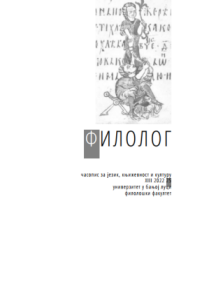УПОТРЕБА ЖЕНСКИХ NOMINA AGENTIS У ОГЛАСИМА
ЗА ПОСАО – УПОРЕДНА АНАЛИЗА СРПСКОГ И
МОДЕРНОГ ГРЧКОГ ЈЕЗИКА
THE USE OF FEMALE NOMINA AGENTIS IN JOB ADVERTISEMENTS – A COMPARATIVE ANALYSIS OF THE SERBIAN AND MODERN GREEK LANGUAGE
Author(s): Antonina V. KostićSubject(s): Language and Literature Studies, Comparative Linguistics, South Slavic Languages
Published by: Филолошки факултет Универзитета у Бањој Луци
Keywords: gender sensitive language; labour market; language and gender; Serbian language; Мodern Greek language;
Summary/Abstract: Language, apart from being a means of communication, is also an important medium for conveying meaning and shaping social and cultural patterns. Additionally, language plays an important role in defining notions such as gender and gender equality (Filipović, 2009; Cameron, 2003). In an era of active participation of women in the labour market, it is important to examine the impact of language on their position in society and their access to various fields (Stout, Dasgupta, 2011). The way in which employers advertise open job positions gives us a great insight into this topic. The aim of this paper is to examine the use of gender-sensitive language in job titles on four search engines in Serbia and Greece. This paper seeks to investigate the extent to which titles of female positions are represented, bearing in mind that the choice of linguistic elements has an impact on the perception of the market reality and the motivation of future employees. Specifically, the focus of the paper lies in the areas of accounting, customer support, translation, insurance, management, marketing, economics and science. Тhe findings are compared within two culturally and socially close contexts, in order to draw conclusions about the position of women in the labour market. The results of the analysis confirm the hypotheses, that is the examined job titles are rarely in line with gender-sensitive language. It was also found that the use of nomina agentis exclusively in the masculine gender is more common in the case of higher positions, especially in the field of management. The paper provides insights into the current situation with which women come into contact when searching for jobs in certain areas. Moreover, the study provides a basis for further research on the relationship between language and gender in the social Serbian and Greek context, respectively.
Journal: Филолог – часопис за језик, књижевност и културу
- Issue Year: 13/2022
- Issue No: 25
- Page Range: 143-162
- Page Count: 20
- Language: Serbian

